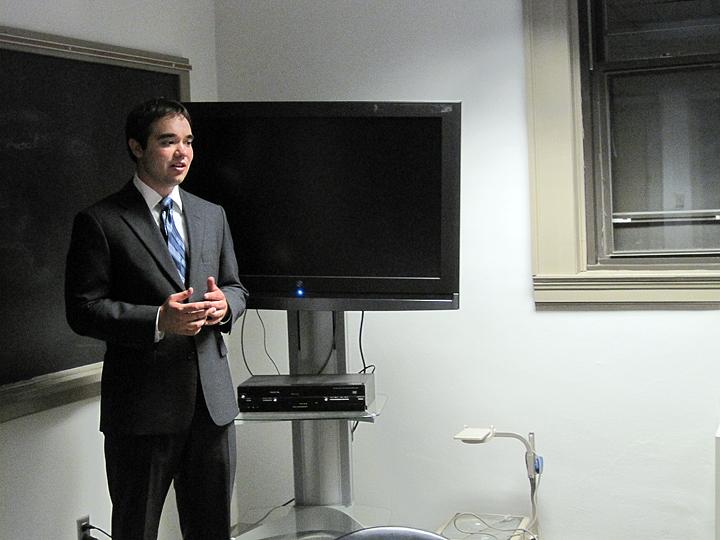This past semester, Nathan Clubb ’11 found a very real-world extracurricular: he ran for public office. While still a full-time student, Clubb campaigned for a seat in the Iowa House representing his home District 76, the district next to Grinnell’s. Clubb, a Democrat, lost the election, but won 34% of the votes against the Republican incumbent Betty De Boef in an election that heavily favored Republicans. He sat down with the S&B’s Chris Nevins to discuss his experiences leading up to the election.

What was it like running for public office?
It was pretty stressful, and it was just really hard to make everyone happy. So many people had different ideas about what they were wanting from the government’s policies. Especially this year, almost everyone had this really negative opinion of Democrats and all Democrats. All kinds of people would be upset and angry about me being a Democrat. These were issues related to the federal government, not the local level. That was sort of tough for me to fight back against because it wasn’t a thing related to my election whatsoever.
How did you balance campaigning with schoolwork?
Well, I tried to organize my schedule starting last year when I knew I was going to run for office in a way that would most efficiently allow me to allocate my resources. I needed a certain set time to go out door knocking and that sort of thing. So when setting my work schedule, I made sure I had my whole weekend clear—I spent all Saturdays doing campaign work—and I made sure I had my Mondays and Wednesdays clear, so I had two other opportunities when I could go out for two or three hours door-knocking. Sundays I just wouldn’t do any campaigning. Two or three days a week, I’d just do a bunch of homework. Usually on Saturday, on campaigns, I didn’t really do any homework. It was just kind of my day off. It wasn’t really a huge loss time-wise there since campaigning is just something I sort of do for fun. Also, I had to sacrifice the amount of time I spent with the golf team.
What was the major platform you ran on?
Helping out young Iowans, especially in a rural community—that was the main focus of my campaign. We have to give them opportunities to excel in local schools—a lot of schools don’t have adequate funding. We need to make sure that the students can afford to go to our state universities and stay in Iowa. Iowa’s universities for some reason produce the largest debt load per capita. We don’t have very good loan programs available—we don’t have very good grant programs. Other places might have higher tuition costs, but with grants, it might be cheaper to go there.
What made you run for office?
I was really not happy with my opponent. She was openly homophobic. She thought that cutting taxes would fix everything. She had no real idea about how she was going to attract jobs to rural Iowa. And she openly said that she supports increased rights for big industry. Usually opponents will attack each other on that. Big industries, big companies aren’t going to come into Iowa. We need to attract small and mid-size companies, small, local energy-producers, things like that.
How did you get interested in politics?
When I was younger, I got really interested in Sunday morning politics shows. Almost every Sunday morning, I used to watch Meet the Press, Iowa Press. I used to read the Des Moines Register. That got me really interested in volunteering for various campaigns when I was a teenager.
What do you hope to pursue in the future? Do you want to run again?
Well, I’ll probably run for public office again. Right now, I just want to get a job in the area and see what happens.




























































